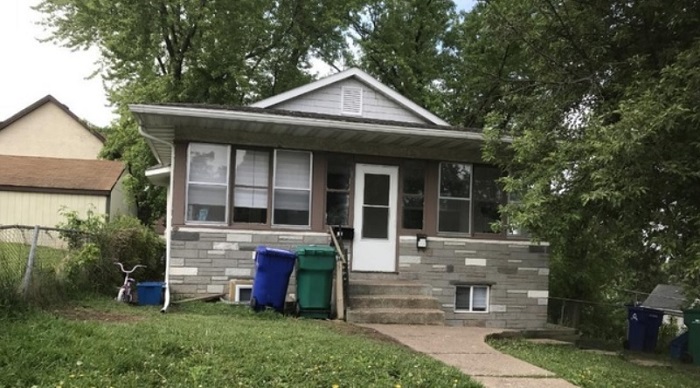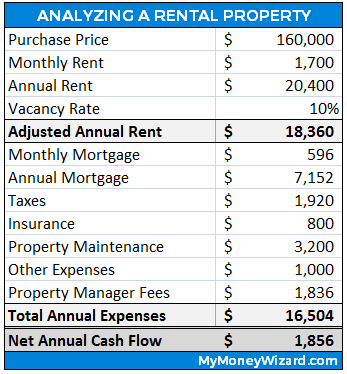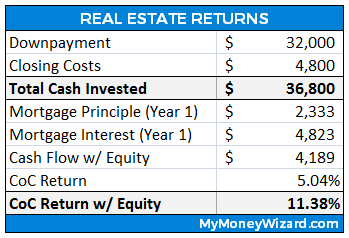
If you’ve been following this blog for a while, you’ve seen my dreams of becoming a property mogul sneaking into various posts.
After all, mogul is such a cool word. Who wouldn’t want to become a mogul of something? It’s like building an empire, which sounds equally cool, and is another not-so-secret goal of mine.
Aside from fancy titles and cool names, I’m attracted to real estate for several reasons. I covered a few of those reasons in my somewhat tongue-in-cheek case for owning your own home, but rental properties present their own set of advantages that I’m much more enthusiastic about.
Reasons Why Rental Property Is Such an Attractive Investment
1. Leverage
Only through real estate can you contribute 20%, or less, and immediately control an asset worth hundreds of thousands of dollars.
How powerful is leverage? As a basic example:
- If the value of a $100,000 property increases to $127,000 in 5 years, you’ve earned about 5% per year.
- If you leveraged that same property by only putting 20% down, you’re looking at returns of 19% per year.
Rental real estate is the perfect investment to leverage. Banks love it because there’s tangible collateral they can collect if things go south, and you love it because you can use other people’s money to get rich. Which leads us to…
2. Cash Flow
Cash is king. And for financial independence, cash flow is king.
We all know investments create returns either through price appreciation or cash flow. While most investments do a little bit of both, real estate is the perfect investment for cash flow.
While stocks are great at silently appreciating through compounding market gains over time, there’s nothing quite like the immediate cash flow of real estate.
Sure, your property probably won’t pull a Tesla and increase in price ten-fold, but you can sleep like a baby when you open the mailbox and see your tenant dropped off yet another monthly rent check.
In the stock market, the best dividend paying company yield around 4%. In other words, you’d need to purchase $750,000 in dividend paying stock if you planned on living off $30,000 per year.
With real estate as an investment, you receive the full amount of cash flow even if you’ve only invested a partial amount of the property’s cost, thanks to the previously mentioned leverage. $30,000 of annual cash flow is as attainable as a 20% down payment on three properties profiting $800 per month.
3. Demand
Even as the real estate market flies up and down on the madness of the economy, everyone still needs a place to live.
Real estate becomes even more recession proof in my target property type – lower priced multifamily properties. While a weakening economy is sure to cause my stocks to tank, the demand for a reasonable place to live might actually increase.
4. It’s a proven business
The cliché of fixing toilets as a landlord holds some truth, but I’d be lying if I didn’t admit there’s a certain level of attractiveness to controlling your own income source.
How many times have you heard this quote – “Man, I’d love to start a business, but I just don’t have that next million dollar idea.”
There’s one business that welcomes anyone regardless of credentials, has been around since the dark ages, and bankers will happily lend you money to get started: real estate.
Open a history book to any page, and you’ll see all throughout history landlords have built wealth through renting property.
5. Generational trends are on your side
I’m getting a little speculative here, but hey, it’s my party and I can cry if I want to.
Owning rental properties makes a lot of sense from a big picture perspective. We know a few things about millennials, and they’re all good for the landlord.
- As record numbers of millennials graduate college with crushing student loans, they are delaying the purchases of homes. What are they doing while they pay off those loans? Renting.
- Millennials are a generation of free spirits, world travelers, and skeptical home owners, thanks to coming of age during the housing collapse. All of this means they’re more likely to continue renting.
- In the 1970s, the median marriage age was 20-23 years old. Today? 26-28 years old. Millennials are more likely to rent until they settle down and get married.

How I Analyze Investment Property
First, a disclaimer. I’m not a real estate agent, and I haven’t (yet) bought a rental property. Below is my thought process as I scroll through Zillow deciding whether I want to tour a potential rental property.
Please, if you spot an egregious error or disagree with me, I encourage you chuck several rotten tomatoes my way. Then let me know in the comments why I’ve been dodging over-ripened fruit all day.
Some Guidelines on Expenses
I talked about several of these when I showed how you can actually lose money on a home that doubles in value, but here are a few helpful guidelines as you do your best to estimate a rental property’s potential:
- Mortgage costs are easy to estimate using a mortgage calculator.
- Property taxes, on average, cost about 1% of the home’s value.
- Allot around 1-2% of the home’s value to maintenance each year, depending on the property’s age.
- Home insurance typically runs about 0.5% of the home’s value each year.
- Your unit won’t be 100% rented all the time. Establish a vacancy rate, keeping in mind that lower income properties have higher turnover than nicer neighborhoods.
- Property managers, if you’re into that sort of thing, charge around 10% of monthly rent.
- Prepare for a 20-25% downpayment and closing costs of at least 3% of the purchase price.
Now, let’s run through the numbers:
We’ve got most of our expenses covered, now let’s run through the numbers using a real example.
Let’s consider the hypothetical purchase of a $160,000 duplex in the Twin Cities. The property is in a somewhat up and coming part of town, although the neighborhood is still a little too rough for me to personally want to live in.

- $160,000 listing price.
- The two current tenants pay $800 and $900 per month, or $20,400 per year.
- We can’t assume full occupancy, so we’ll deduce 10% for vacancies. Adjusted gross rent = $18,460
- The mortgage, property taxes, and insurance total $9,900, using the guidelines above.
- Maintenance and property management will cost an additional $5,000 per year. (2% of purchase price and 10% of rent, respectively)
- $1,000 expense just for fun, since it snows a lot in Minnesota and we’ll need someone to take care of it.
- Annual cash flow: about $1,800
That’s a lot of numbers, and this site isn’t meant to be hard work. Here’s a table to help you out:

$1,856 on a $160,000 investment wouldn’t normally be exciting. But real estate investing holds two big advantages: leverage, and renters helping you pay off an asset.
We didn’t actually invest $160,000 in the property. Our investment only included the downpayment and closing costs.
- 20% downpayment – $32,000
- Closing costs – $5,000
In other words, a total investment of about $37,000. Now, with cash flow of $1,856 we’re up to a 5.04% return on the cash we invested. This is called the “cash on cash return,” and although it sounds like something out of a rap video, it’s a good metric to show the power of leverage.
But wait, those renters are also helping you pay down the mortgage and build equity in the house. Once we add back the $2,000 of principle included in our first year of mortgage payments, the cash on cash return is all the way up to 11.38%.

Plus, since the amount of principle paid increases over a loan’s life, this return will increase with each year. If rents increase as well, even better.
We’re now past the range of normal stock market returns, and there’s room to do better.
Mortgage interest paid, property taxes, and deprecation are all tax deductible. I’m no tax expert, and everyone’s situation is different. In any case, it’s likely the benefit of tax deductions could push this rental property’s first year cash on cash return near 15%.
Am I Buying This Property?
Overall, this property is not bad, especially for the first duplex I picked off somewhat-randomly from Zillow.
Am I rushing out to buy this property tomorrow? No, for two reasons.
1) I don’t have $38,000 cash, and my ideal rental property wouldn’t need me to liquidate assets for the initial investment.
I know enough about investing to recognize when I’m not an expert, and I’m definitely not an expert real estate investor. For that reason, I’d like to avoid risking any of my nest egg while dabbling in real estate.
2) The numbers for the second and third properties I randomly picked off Zillow looked similar, telling me there’s plenty of deals to be had in this neighborhood. Like Warren Buffett once said:
The trick in investing is just to sit there and watch pitch after pitch go by and wait for the one right in your sweet spot. And if people are yelling, ‘Swing, you bum!,’ ignore them.” -Warren Buffett on investing.
Related Posts:


Oooh, thanks for these tips! I have to admit I’m drawn to the idea of leasing property. There’s just that pesky issue of having capital to get it all started, eh? 😉
I own a double that has never gone vacant more than two weeks – usually less. My advice would be Location! Location! Location! A high demand area with a short commute time to major areas will pay for itself in rent and in the ease of finding tenants. The other things that have been successful for us is that we updated the floor plan to open concept and even though we could afford to have a cleaning crew clean between tenants, my husband and I clean it ourselves to pristine standards. 95% percent of the tenants who have rented from us commented on that fact as one of the reasons they leased it. Besides wanting a clean place, I believe it gives them confidence in the fact that we will maintain it properly.
Excellent analysis! Rental houses and house hacking are great ways to quickly increase cash flow and net worth!
You need to keep tax laws in mind. That’s the missing factor from your calculations and its my major concern because taxes on property change from state to state. An option that sounds good in one country may not sound the same way in another place. I think you should guide the investors on this side as well.
Hi Money Wizard,
I really enjoy reading your posts. Because I spend my money they same way as you and I have the same mindset. But I also invest into real estate and own real estate in Austria (so your are really famous).
If you are going to invest into real estate. Not only the cash-flow perspective is important. Important is that you buy appartments in a bigger complex. Beause if something happens (e.g. the roof is broken) there are a lot of other owner which will pay typically the costs for the broken roof. So this is very important for the first 1-5 appartments (diversification is also important in the real estate market). And only buy appartments with 15% free cash-flow. And at least hold enough cash for troubles (1 year rental income).
Greetings from Austria – not Australia
Mike
Good suggestion Mike. Over here what you’re describing is usually part of a condo complex with a home owner’s association. The fees are usually very high for these associations, typically $300+ per month where I am, so it’s almost a forced saving plan for that inevitable broken roof. Is that similar to Austria?
Thanks for sharing your experience.
In Austria there are both opportunities (associations and no associations). But it is very hard to find good appartments in a normal complex and there are a lot of other competitior so you must be VERY qucik (typically 1 day). But my advice to you, don’t by a single-family house the risk is too high. If you by a single-family house you must buy at least 5 houses to reduce the vacancy risk!
Good point, and a big reason why my ideal place would be a 2-4 unit multifamily.
I’d go with crowdfunding if I were you. Forget tangible properties. Buy a share of a multi family property through http://www.realtyshares.com or http://www.crowdstreet.com
You’ll pay annual fees but they total far less than your costs in this example and you won’t receive phone calls from tenants in the middle of the night!
Thanks for the suggestion. I’m still torn on real estate crowdfunding though. May be a topic for a future post…
Woah! I didn’t knew Rental Property Investment can be this much fruitful. Thanks for the awesome explanation buddy.
this is a test
Did we pass?
Nope. The only people who pass Terry’s tests are landlords.
I liked your analysis and how you put down the numbers. However, you did forget to add to your calcs the taxes that you would owe to IRS. Because that is additional to your income, that might put one in a different tax bracket then increasing the taxes owed.
Thanks, and that’s a good point, but it’s not really standard practice to evaluate taxes owed on investments. For example, it’s technically accurate to subtract the 15% long term capital gains from the 7% historical return of the stock market, but for simplicity’s sake we don’t do this. I agree it would be more accurate though, and it’s always smart to get specific on the tax laws prior to any investments.
Milliondollars are you talking about how the rent income would be considered taxable income?
I’ve been looking into investment properties as well. Sometimes it seems like it’d be a lot of trouble given the potential benefit. Multi-family units, often found in poorer neighborhoods seem to have the best cash flow potential to make the investment worthwhile. This is partially offset by the fact that these are often older houses and since they are in poorer neighborhoods, there’s possibly less potential for home appreciation unless the neighborhood gentrifies. I’d like to avoid the type of tenant issues and high maintenance costs that Gwen over at fierymillenials is having.
That said, there’s definitely a benefit to being leveraged…having potential to gain value on the home’s entire value, while only having invested the down payment and any mortgage payments up to a point in time. On top of all this, the stock market seems like a minefield of overvalued stocks which is primarily why I’ve been looking for an alternative. Even Vanguard and Bogle have both separately stated that the market outlook is guarded for the decade to come. If I thought the market would make 7%+ for the next decade on average, I probably wouldn’t be considering an investment property right now.
Ideally, when my apartment lease is up, I’d buy a duplex and rent one unit and live in the other. Then I’d save up for a second duplex and repeat the process until I had three duplexes.
Is the difference in reward worth the difference in time and risk? I’m just not convinced it is. Crowd funding seems to be a plausible compromise, but then I believe also potentially difficult to fully analyze the property.
I guess if someone had a decent size investment portfolio and they could sell a small portion (10%) to pay the initial cash flow to get started, that might be a good way to tip-toe into it. But leverage works both ways. You can lose a lot more if you don’t have much invested and things go south.
This is exactly the sort of things we’ve been thinking through lately too! Who knows what the future holds… Good for you to keep learning, but the best way to start, is to start! Good luck
Mr. Wizard,
Have you done any research into property managers? Am I correct that they will set up repairs and then send you the bill? And this is what the $3,200 maintenance expense is reserved for? Does this mean that a rental property (with an effective property manager) would count as a completely passive income?!
Great read! You are wise to focus on the cash flow. In real estate cash flow is king. You are also right about leverage and how it can exponentially increase returns.
Cash on cash is one of the best metrics to use for real estate investing. What is your required return?
Would you self manage?
Can’t wait to see how your real estate interests evolve and hope to read about an acquisition in the future.
You talk about the advantage of leverage in real estate. A bank would easily lend against your brokerage account. Have you thought about doing that for a down payment? You would have to factor in the interest expense of the additional loan. However, with moderate appreciate and some basic renovations you could probably refinance the mortgage to pay back that brokerage loan and end up with no cash in the deal. Just some thoughts. Obviously getting too leveraged is dangerous, but there could be opportunity there if done wisely. Where I invest you can get a rental with these returns for $40-50K, having a HELOC or brokerage secured line makes it easy to make cash offers to get better deals, which can then get refinanced, underwritten by the bank on the rents. Seems like it might not be the same case in MN. Thoughts?
Also, just discovered your site! Sorry for the comment on such an old post!
Interesting thought…
I’d be worried it’d negatively impact the property’s cash flow too much. Maybe not though; definitely something to run the numbers on!
Wow! Thanks for the reply!
Some further thoughts…Interest rates on margin lines are typically very cheap since they are secured by liquid assets, you could probably find 3.5%-4%, if not much cheaper and you can easily have a line with 50% LTV against the account. As long as your cash earns at least that by putting it into your brokerage account (which it looks like it does), instead of the real estate, you wouldn’t be offsetting the interest on the line with just cash flow from the property but also the return you get on the money elsewhere. There is always an opportunity cost when you put cash into real estate, this avoids that at a fairly cheap rate. Run some numbers for sure though, this is a rich guy move, which I am not!